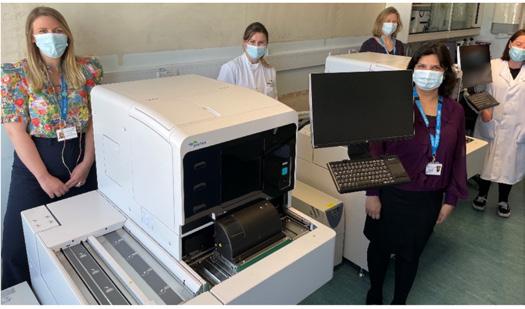Sysmex Connect – May 2021
Scientific Trainee placement: Haematology laboratory at the Queen Elizabeth Hospital Gateshead Over the past 18 months, George Tarpley has completed the scientific trainee internship at Sysmex UK and we are now delighted to announce that George will soon be joining our Haemostasis Team as an Application Specialist. During his time as the scientific trainee, George spent 18 months on a placement at the Haematology Laboratory at Queen Elizabeth Hospital Gateshead, South of Tyne and Wear Clinical Pathology Services. At Sysmex UK, the development of our young scientists within the industry is something we continue to support through opportunities such as The Carol Briggs Award – the poster competition that is linked with our annual user symposium. Another avenue of support was the scientific trainee internship that George has just completed. As George’s placement comes to an end, and having recently become HCPC registered, we thought it would be great for him to share his experience of the past 18 months as a young scientist and the challenges faced completing his placement during the COVID-19 Pandemic.
current clinical knowledge and application in my role as a Haemostasis Application Specialist at Sysmex UK. My project topic was selected as ‘a retrospective study to investigate the potential contribution of novel haemocytometric parameters in the differential diagnosis of viral / bacterial infection through routine full blood count analysis’ where data was obtained during my laboratory placement and will be analysed in the near future.
Tell us about your educational background before starting as the scientific trainee at Sysmex UK. Prior to commencing the scientific trainee role at Sysmex UK, I had spent 4 years completing a BSc in Human Biolog y from Loughborough University. During this time, I spent a year in an industry setting as part of the haematology product team at Sysmex UK. Throughout this initial placement at Sysmex UK, I gained exposure to instrument installations and verifications, customer training, software upgrades, software installations, regulatory administration tasks, and experience in the customer support centre to name a few. I was also given the opportunity to support the initial studies of XN blood bank mode in collaboration with the Component Development Laboratory at NHSBT. As a young scientist, the experience I gained during my year in an industry setting primed me for the scientific trainee placement through developing instrument expertise, in particular automated haematology solutions, however at this point I still had no real working experience within a clinical laboratory.
How do you balance your MSc studying schedule with your work schedule? The MSc is entirely coursework based. Time management is critical for the completion of the modules and Gantt planning charts have been utilised over the previous semesters to ensure specific tasks are complete with weekly deadlines. Ultimately part-time study alongside work requires self-sacrifice out of personal time for completion. Are there any areas of training you would like to focus on next? I would like to further develop my clinical and practical experience with Sysmex haemostasis instrumentation – in particular specialist assays such as fibrinolytic inhibitors, thrombophilia screening and platelet function testing.
Did you complete any formal educational studies whilst on the scientific trainee programme? During the first 12 months of my placement I completed a PostGraduate Diploma in Biomedical Sciences via distance learning at the University of Ulster, in order to top up my Human Biology BSc for IBMS accreditation. This consisted of four 20 credit modules including Haematology and Transfusion, Clinical Immunology, Medical Microbiology and Clinical Biochemistry. After completion, I then completed the IBMS registration portfolio and after verification gained HCPC registration as a Biomedical Scientist.
In your opinion, how would you describe the characteristics of a good Biomedical Scientist? From my experience, a good BMS is one who pays attention to detail, who can communicate effectively and one who is able to multi-task under pressure. Collaboration between staff members with accurate information is pivotal for maintaining high throughputs, escalating results and handing over information between shifts.
What MSC are you doing now and what modules are you taking?
What laboratory skills did you develop during your placement in the role of scientific trainee?
I am currently studying an MSc in Biomedical Science via distance learning at Anglia Ruskin University. Modules to date have included: general pathology, moving towards aastery, introduction to management in biomedical sciences and research methods. In year 2 of the MSc I will be studying the epidemiology, pathogenesis, diagnostics and treatment of a chosen topic within the field of haemostasis – with the mind set for these modules to develop my
Having no prior laboratory experience outside of my academic programme, my laboratory placement exposed me to basic fundamental laboratory skills such as laboratory health and safety, manual handling, data protection, collaboration with patient care teams, sample pre-analytics and more specific skills such as clinical result interpretation, blood film examination, blood grouping, 14





